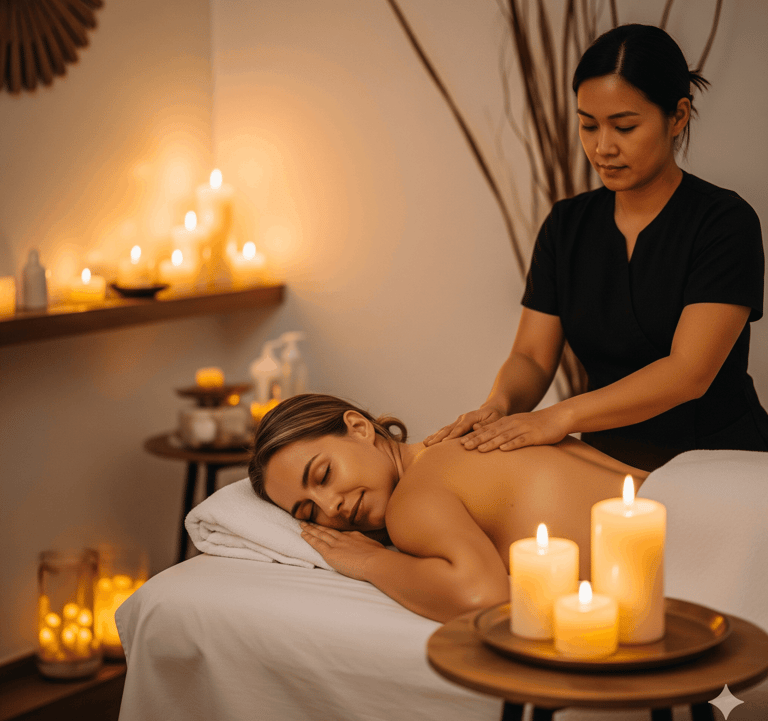Relaxation & Stress Relief Massage FAQs
How does massage reduce stress?
Massage lowers cortisol (the stress hormone) and increases serotonin and dopamine, the body’s natural mood stabilizers. The gentle touch, calming environment, and rhythmic strokes help relax the nervous system, allowing the body to switch from a “fight or flight” state into a “rest and digest” mode.
Which massage is best for stress relief?
Swedish massage is considered the best for overall relaxation, thanks to its long, flowing strokes. Aromatherapy massage, which incorporates essential oils like lavender, chamomile, or sandalwood, is also excellent for calming stress.
How long does the relaxation effect of massage last?
The calming effects can last from a few hours to several days. Regular sessions (weekly or monthly) can create lasting improvements in stress management and emotional balance.
Can massage help with anxiety?
Yes. Research shows that massage can lower anxiety levels by slowing heart rate, relaxing muscles, and promoting deeper breathing. It also creates a sense of nurturing touch, which can reduce emotional tension.
Does massage help with depression?
Massage may not cure depression, but it can ease symptoms by increasing serotonin and dopamine levels, reducing fatigue, and encouraging feelings of connection and self-care. Many people with depression find massage supportive as part of a broader wellness routine.
Can massage improve focus and mental clarity?
Yes. By lowering stress and relaxing the mind, massage helps clear mental fog. Better blood flow to the brain and reduced muscle tension often leave people more alert and refreshed.
In today’s fast-paced world, stress affects both body and mind. Relaxation massage is one of the most effective natural ways to calm the nervous system, reduce anxiety, and restore balance. This page answers the most common questions about how massage helps with stress relief, sleep, and overall well-being.
What role does breathing play in relaxation massage?
Deep, slow breathing during a massage amplifies relaxation. It increases oxygen flow, lowers heart rate, and enhances the connection between body and mind. Many therapists guide clients through breathing techniques to deepen the calming effect.
Are there specific oils that help with stress relief?
Yes. Essential oils like lavender, bergamot, rose, and frankincense are known for their calming effects. When used in massage, they enhance relaxation through both scent and skin absorption.
Can massage help lower blood pressure?
Regular massage has been shown to reduce blood pressure by relaxing blood vessels, lowering stress hormones, and calming the nervous system. This makes it beneficial for cardiovascular health.
How does massage help with muscle tension caused by stress?
When we’re stressed, muscles unconsciously tighten, especially in the neck, shoulders, and back. Massage physically loosens these knots, improves circulation, and signals the nervous system to release tension.
Can massage replace meditation for stress relief?
Massage and meditation complement each other. Massage offers external relaxation through touch, while meditation works internally through awareness. Many people combine both for deeper stress management.
Is one session enough to reduce stress?
One session can provide immediate relief, but ongoing sessions create lasting results. Stress tends to build up daily, so regular massage is more effective in maintaining balance.
Can massage help with insomnia caused by stress?
Yes. By reducing tension and balancing stress hormones, massage encourages the body to relax into deeper sleep. Evening sessions are especially beneficial for insomnia sufferers.
Is head massage good for relaxation?
Absolutely. Head and scalp massage improves blood circulation, reduces headaches, relaxes facial muscles, and creates a calming sensation that spreads throughout the body.
How does aromatherapy enhance stress relief massage?
Aromatherapy adds an extra layer of relaxation. Scents like lavender calm the nervous system, citrus oils uplift mood, and sandalwood grounds emotions. Combined with massage, it creates a multi-sensory relaxation experience.
Can massage help during stressful life events?
Yes. During times of grief, job stress, or major transitions, massage provides emotional comfort, reduces physical strain, and offers a safe space to release tension.
How long should a relaxation massage last?
A 60-minute session is ideal for full-body relaxation, while a 90-minute session allows for deeper work and a slower pace. Shorter sessions can help, but longer ones are better for stress relief.
Can stress relief massage boost productivity?
Yes. Relaxed muscles, a calmer mind, and improved circulation enhance focus and energy levels, which often lead to better productivity at work or in studies.
Are there any side effects of stress relief massage?
Usually, side effects are minimal. Some people may feel sleepy, thirsty, or mildly sore afterward. These effects are temporary and can be eased by drinking water and resting.
How can I extend the benefits of a relaxation massage?
Stay hydrated, stretch gently, practice deep breathing, and avoid rushing back into stressful activities immediately. Many people extend the benefits by pairing massage with yoga, meditation, or mindful walks.
How often should I get a stress relief massage?
For people with high stress levels, once a week or every two weeks works best. For general maintenance, once a month is often enough to keep stress under control.


Our Massage Therapy FAQ Hub is designed to clear doubts and provide reliable information. Select a category below — General Massage, Relaxation & Stress Relief, Swedish, Deep Tissue, Prenatal, Sports, Thai, Couples, and more. Each FAQ page gives in-depth answers to the questions most people ask before booking or experiencing a massage.
URBAN MASSAGE GUIDE
Your trusted source for massage knowledge and wellness insights.
Have a question or suggestion?
Reach us at: urbanmassage@gmail.com
Quick Links:
© 2025 Urban Massage Guide. All rights reserved.
Disclaimer : Urban Massage Guide is built to share knowledge about massage therapy and promote wellness awareness. We respect your privacy and do not share any of your personal information.
